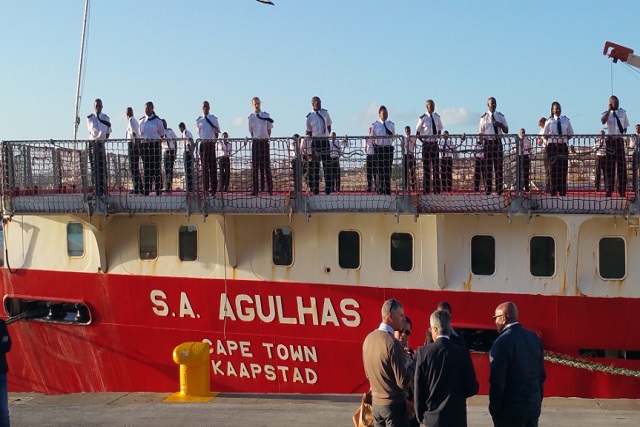It’s all ‘hands on deck’ for the 10 chosen Durban University of Technology (DUT) trainee officers (cadets) who are travelling on the SA Agulhas to undergo seafarer training, as part of an international Antarctic research expedition with international scientists, for a period of three months.
The 10 DUT cadets form part of the 20 newly, selected South African cadets under the Port Elizabeth based South Africa International Maritime Institute (SAIMI), which also has 10 cadets from the Cape Peninsula University of Technology (CPUT), on the expedition.
The SA Agulhas, South Africa’s only committed cadet training ship, falls under the helm of the South African Maritime Safety Authority (SAMSA. The South African ice-strengthened training ship and former polar research vessel will have DUT cadets, Pranav Maharaj, Majaha Kelvin Dube, Lindokuhle Senzo Majola, Phakamile Xaki, Clementine Fundiswa Dlamini, Sibusiso Khawula, Mluleki Mark Khwela, Muziwenkosi Ben Mbanjwa, Imryn Sphesihle Mkhize and Nothando Minange, forming part of the scientific and training expedition. They will now be given the opportunity to utilise their navigation skills learnt in situations through the use of technology to promote the safety and efficiency of navigation on board.
This is the second time DUT cadets, who are studying towards their National Diploma in Maritime Studies and have completed their S4, are now embarking on such an expedition which forms part of their one year in-service training.
The South African Maritime Safety Authority (SAMSA), the accreditation body which was established on 1 April 1998, to promote South Africa’s maritime interests; are responsible for providing such opportunities of a lifetime for these young people.
According to the SAMSA statement released this week, the expedition will provide the cadets with new opportunities and create awareness about our oceans and help to contribute towards our oceans economy. The SAMSA statement also stated that the ship will first stop over in Mauritius to collect international scientists from India and then sail off to Antarctica to spend three months on its research mission. It is estimated that the voyage will take about four weeks to reach its destination.
DUT’s Maritime studies HOD, Mr Leon Govender said these DUT cadets are becoming navigation officers so they would be working with all the different equipment on the navigation bridge and learning about cargo work, to name but a few. “The structure is that they go from being a cadet and serve 12 months of sea time and also learn a whole lot of auxiliary courses such as first aid and survival at sea,” he said.
He added that all the Work Integrated Learning(WIL) component time-frame is a minimum of 12 months but some students may need to do 18 months to complete their tasks because there are a whole lot of outcomes which need to be addressed. “It’s a structured programme with a record book to meet international standards because the students end up working anywhere in the world. They qualify, once qualified they have to do more sea time to become a chief officer, and then again more sea time. Basically from the starting point to becoming a captain on board the ship takes about 10 years. This is the beginning of their journey,” he said.
Govender added that DUT supports this initiative which forms the first stage and when they return from this stage of their WIL, international companies will then interview them (cadets) and then they will go on to work at one of the bigger shipping companies like MSC or Maersk. “They will serve four months which makes them more marketable, we wish them all the best as they then end up getting more absorbed into the international shipping labour market,” he said.
Pictured: DUT and CPUT cadets on board the SA Agulhas.
Picture credit: blog.samsa.org.za
Waheeda Peters


